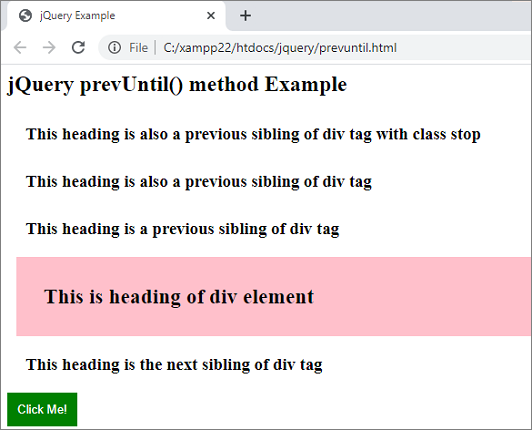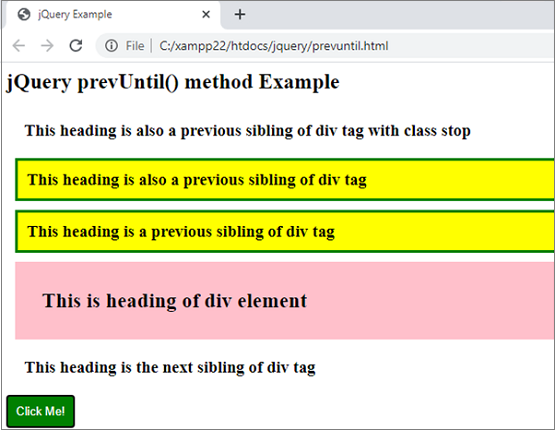jQuery prevUntil()
0 1796
- This jQuery method is used to fetch the all previous sibling elements of the selected HTML element between the two given elements (selector and stop).
- If we talk about the DOM traversal tree, this method traverses backward along the all siblings of the DOM tree nodes.
- To traverse the only the forward DOM elements or next siblings of the selected element, use next() jQuery method.
- To traverse both forward and backward DOM elements or siblings of the selected element, use siblings() jQuery method.
- To return only the one previous sibling of the selected HTML element, use prev() jQuery function.
- To return all previous sibling of the selected HTML element, use prevAll() jQuery method.
Siblings: siblings are the elements which has the same parents as selected element.
Related Topics:
jQuery parents
jQuery parent
jQuery prevUntil
Syntax:
$(selector).prevUntil(stop,filter) ;
Parameter description:
- stop: This parameter used to indicates where to stop the search for previous matching sibling elements. It can be an expression, element or jQuery object. It is optional.
- filter: This parameter is used to narrow down the search for all previous sibling elements between the selector and stop. It can be an expression, element or jQuery object. It is also optional.
Example:
In this example we highlight the all previous sibling element of <div> before the <h3> element with class stop.
<html>
<head>
<title> jQuery Example </title>
<script type = "text/javascript"
src="https://ajax.googleapis.com/ajax/libs/jquery/3.5.1/jquery.min.js">
</script>
<style>
div{
background:pink;
padding:10px;
margin:10px;
font-size:20px;
}
h3{
padding:10px;
margin:10px;
}
button{
background:green;
padding:10px;
color:white;
border:1px solid green;
}
</style>
<script>
$(document).ready(function(){
$("button").click(function(){
$("div").prevUntil("h3.stop").css("border":"3px solid green","background":"yellow"});
});
});
</script>
</head>
<body>
<h2> jQuery prevUntil() method Example </h2>
<h3 class="stop">This heading is also a previous sibling of div tag with class stop </h3>
<h3> This heading is also a previous sibling of div tag </h3>
<h3> This heading is a previous sibling of div tag </h3>
<div>
<h3> This is heading of div element </h3>
</div>
<h3> This heading is the next sibling of div tag </h3>
<button> Click Me! </button>
</body>
</html>
Output:

When you click the button,


Share:







Comments
Waiting for your comments